|
|
|
Sort Order |
|
|
|
Items / Page
|
|
|
|
|
|
|
| Srl | Item |
| 1 |
ID:
121414
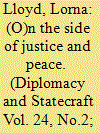

|
|
|
|
|
| Publication |
2013.
|
| Summary/Abstract |
Although very much an international novice, Canada secured election to the League Council in September 1927. It did not, on the whole, have a notable impact on its proceedings. Its people, too, were little moved by its presence at Geneva. And while its Prime minister enjoyed his one visit to the League, his scepticism about it remained undimmed. Nonetheless, its three-year Council term had a number of important consequences. It engineered what was on the face of it a significant amendment to League procedures regarding minorities. The experience and horizons of its Department of External affairs were widened. It became accepted that a Dominion-or India-should always sit on the Council. Its status-and that of the other Dominions-as states equal with Britain was underlined. And by demonstrating that it was not in Britain's pocket, Canada's political standing was greatly enhanced. Internationally, it had arrived.
|
|
|
|
|
|
|
|
|
|
|
|
|
|
|
|
| 2 |
ID:
090779
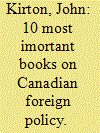

|
|
|
|
|
| Publication |
2009.
|
| Summary/Abstract |
In many ways the scholarly study of Canadian foreign policy has become a rich, robust, and rapidly growing field. It is now well over a century old, if one dates its inauguration from the publication of Goldwin Smith's Canada and the Canadian Question in 1891, a book that understood that Canada's relationship with the United States was properly part of, or even at the centre of the field.
|
|
|
|
|
|
|
|
|
|
|
|
|
|
|
|
| 3 |
ID:
075860


|
|
|
|
|
| Publication |
2006.
|
| Summary/Abstract |
Maliseet is one of many Canadian aboriginal languages that are projected to become extinct within the next twenty years. This article examines the events surrounding Maliseet language instruction that contributed to enactments of resistive strategies that corresponded to varieties of power relations-a process I call aboriginality. The local acts of resistance are situated in the Canadian nation-state ideology of "two founding cultures." I argue the local acts of resistance challenge local asymmetrical power relations while also addressing nation-state ideologies of dominance and coercion. Initially, the focus of resistance was confined to local domains, but over a period of three years, resistive strategies changed to confront global dominance and coercion. I argue the implications of such shifts in strategies and scales of resistance reflect an "aboriginal social imaginary," which holds promise for the survival of aboriginal languages as well as meaningful participation in the "modern social imaginary" called modernity
|
|
|
|
|
|
|
|
|
|
|
|
|
|
|
|
| 4 |
ID:
103463
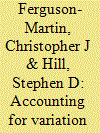

|
|
|
|
|
| Publication |
2011.
|
| Summary/Abstract |
Wind energy deployment varies widely across regions and this variation cannot be explained by differences in natural wind resources alone. Evidence suggests that institutional factors beyond physical wind resources can influence the deployment of wind energy systems. Building on the work of Toke et al. (2008), this study takes a historical institutionalist approach to examine the main factors influencing wind energy deployment across four Canadian provinces Canada: Alberta, Manitoba, Ontario and Nova Scotia. Our case studies suggest that wind energy deployment depends upon a combination of indirect causal factors-landscape values, political and social movements, government electricity policy, provincial electricity market structure and incumbent generation technologies and direct causal factors-grid architecture, ownership patterns, renewable incentive programs, planning and approvals processes and stakeholder support and opposition.
|
|
|
|
|
|
|
|
|
|
|
|
|
|
|
|
| 5 |
ID:
052601
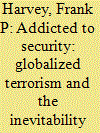

|
|
|
|
|
| Publication |
Winter 2003-04.
|
|
|
|
|
|
|
|
|
|
|
|
|
|
|
|
| 6 |
ID:
094580
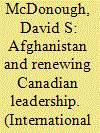

|
|
|
| 7 |
ID:
085814
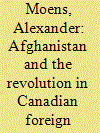

|
|
|
|
|
| Publication |
2008.
|
| Summary/Abstract |
After the cold war, Canada continued to participate in UN peace keeping missions and NATO operations, but there was no overall strategic sense about priorities.
|
|
|
|
|
|
|
|
|
|
|
|
|
|
|
|
| 8 |
ID:
186872
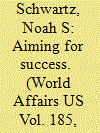

|
|
|
|
|
| Summary/Abstract |
Despite the popularity of the Evidence-Based Policy Making paradigm, scholarly evidence often fails to have an impact in emotional or value-laden policy debates. Consequently, changes to Canada’s gun control laws in recent years have often failed to incorporate scholarly research. This is problematic given that the forces of path dependence impose costs on policy makers who seek to reverse established policies, even if they are dysfunctional. This article lays the theoretical foundations for a Firearms Policy Evaluation Framework, which can be used by scholars, policy makers, advocates, and the public to conduct preliminary evaluations of proposed firearms policies before they become law. The utility of the framework is then demonstrated with an evaluation of the 2020 assault-style weapons ban in Canada, which includes a systematic scoping review of the literature on the impact of assault-weapons bans.
|
|
|
|
|
|
|
|
|
|
|
|
|
|
|
|
| 9 |
ID:
100070
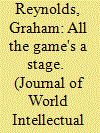

|
|
|
|
|
| Publication |
2010.
|
| Summary/Abstract |
The primary purpose of this article is to examine the extent to which Canada's copyright laws permit the creation of machinima, an art form broadly defined as the creation of films within video games. This article is structured as follows. First, it will introduce machinima, discussing its origins, its development and its social importance. Second, it will examine whether the acts of creating and distributing machinima infringe copyright in Canada. Third, it will ask whether there are any defences to copyright infringement on which machinimators (those who create machinima) can rely. This article will demonstrate that, in many cases, the creation and distribution of machinima likely infringes Canadian copyright law. Furthermore, a large percentage of machinima that are found to infringe copyright will not be protected by the fair dealing defence as it is currently being applied by Canadian courts. This article will conclude by situating the narrow issue of machinima and copyright infringement within the broader context of creativity and copyright reform in the digital age.
|
|
|
|
|
|
|
|
|
|
|
|
|
|
|
|
| 10 |
ID:
151357
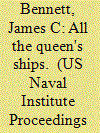

|
|
|
|
|
| Summary/Abstract |
Bringing the navies of Canada, Australia, New Zealand, and the United Kingdom together under common command would make for a formidable naval force.
|
|
|
|
|
|
|
|
|
|
|
|
|
|
|
|
| 11 |
ID:
056095


|
|
|
| 12 |
ID:
159440
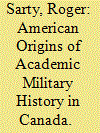

|
|
|
|
|
| Summary/Abstract |
C. P. Stacey (1906–1989), Canada’s first academic military historian, owed his career to opportunities in the United States. He was at an academic dead end when Princeton University provided a Ph.D. fellowship and employment. Carnegie Endowment funding allowed him to publish his thesis as Canada and the British Army, the book that secured his future. It remains the foremost account of how confrontation between Britain and the United States in the 1840s–1860s brought the creation of the modern Canadian state in 1867, which helped set the course for rapprochement and then alliance among the three nations.
|
|
|
|
|
|
|
|
|
|
|
|
|
|
|
|
| 13 |
ID:
138289
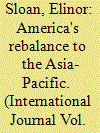

|
|
|
|
|
| Summary/Abstract |
This paper examines the impact of the US pivot to the Asia-Pacific on Canada’s strategic thinking and maritime posture. It highlights elements of the US rebalance before examining Canada’s recent past, present, and future strategic and military engagement. Canada wants to be able to contribute to crisis de-escalation if regional tensions lead to conflict, yet the Royal Canadian Navy has less deployment capacity today than it has had in 25 years. To contribute to mediatory influence, and provide warfighting capability, a recapitalized navy should increase deployments to the region, forward deploy some naval assets, and ensure interoperability with its US counterpart. In the event of a crisis, a choice might have to be made between a neutral, honest-broker stance and a more likely decision to contribute forces to a US-led coalition. The first step in either case is to be in the Asia-Pacific region with capable and credible naval forces.
|
|
|
|
|
|
|
|
|
|
|
|
|
|
|
|
| 14 |
ID:
175894
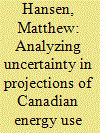

|
|
|
|
|
| Summary/Abstract |
This paper analyzes the uncertainty associated with Reference Case, or baseline, projections of Canadian energy use and production. We use the Canada Energy Regulator's Energy Futures modeling system to explore the impacts of changing key assumptions. The choice of assumptions and magnitude of change are guided by the scenarios in the Energy Modeling Forum (EMF) 34 project. We find important variations across all scenarios. In particular, we note that Canada's role as an energy producer is important for interpreting projection and scenario results. Overall, this analysis shows that it is important to test key assumptions in a typical Reference Case projection. However, this analysis also highlights many complexities in energy system modeling. It is also important to consider the potential interplay between key variables. This speaks to the importance of broader scenario analysis, where multiple assumptions are changed in an internally consistent way, as a useful complement to the focused scenario analysis found in this paper.
|
|
|
|
|
|
|
|
|
|
|
|
|
|
|
|
| 15 |
ID:
099444
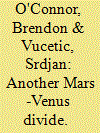

|
|
|
|
|
| Publication |
2010.
|
| Summary/Abstract |
Why did Australia fight in Iraq, while Canada did not? In this paired comparison, we go beyond explanations centered on the role of leaders to consider three alternative factors-ruling party opinion, public opinion and strategic culture. We argue that in both countries the Iraq decision followed the dominant views within the ruling party as well as the dominant strategic culture among the elites. As for the public opinion, its impact was significant in Canada, especially concerning the province of Quebec, while in Australia its impact was mostly neutral. This type of explanation, we suggest, is not only more historically grounded, but it can also illuminate broader patterns of Australian and Canadian foreign policy behaviour.
|
|
|
|
|
|
|
|
|
|
|
|
|
|
|
|
| 16 |
ID:
104171
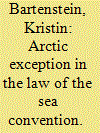

|
|
|
|
|
| Publication |
2011.
|
| Summary/Abstract |
This article examines the so-called "Arctic exception," Article 234 of the 1982 UN Convention on the Law of the Sea. Article 234 is intended to give the coastal state of ice-covered sea areas the necessary powers to prevent, reduce, and control vessel source pollution, which poses a particular risk to the highly sensitive Arctic marine environment. The aim of this article is to present a thorough interpretation of Article 234 in order to eventually evaluate the provision's significance for Arctic navigation, specifically in the Canadian Arctic and the Northwest Passage.
|
|
|
|
|
|
|
|
|
|
|
|
|
|
|
|
| 17 |
ID:
106468
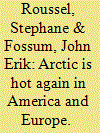

|
|
|
| 18 |
ID:
135096
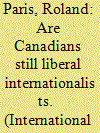

|
|
|
|
|
| Summary/Abstract |
Since coming into office in 2006, the government of Prime Minister Stephen Harper has rejected many of the symbols and practices of the liberal internationalist approach to foreign affairs that Canadian governments of all political stripes broadly embraced during the preceding six decades. As part of this change, the Harper government has also promoted a new narrative about Canada’s history and foreign policy, which encourages Canadians to change how they think about their country and its role in the world. By examining recent opinion surveys, this article asks whether Canadian public attitudes on foreign policy have shifted away from liberal internationalism and toward the Harper government's narrative since 2006.
|
|
|
|
|
|
|
|
|
|
|
|
|
|
|
|
| 19 |
ID:
130322
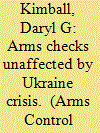

|
|
|
|
|
| Publication |
2014.
|
| Summary/Abstract |
Although the widening confrontation over the political future of the Crimean peninsula and other parts of the former Soviet Union has ruptured already-strained relations between Moscow and the West and put at risk the implementation of some nuclear risk-reduction initiatives and agreements, Russia is not planning to stop allowing the on-site inspections required under the 2010 New Strategic Arms Reduction Treaty (New START), Russian officials said last month. To protest Russia's actions to take control of Crimea, the seven non-Russian members of the Group of Eight (G-8) industrialized countries have suspended Russia's membership in the group. As part of that decision, the seven countries-Canada, Italy, France, Germany, Japan, the United Kingdom, and the United States-changed the location of their planned June summit from Sochi to Brussels. The Russian actions in Crimea have disrupted planning for the activities of the Global Partnership against the Spread of Weapons and Materials of Mass Destruction, which the G-8 launched in 2002.
|
|
|
|
|
|
|
|
|
|
|
|
|
|
|
|
| 20 |
ID:
130356
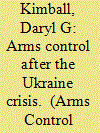

|
|
|
|
|
| Publication |
2014.
|
| Summary/Abstract |
The Global Nuclear Disarmament and risk reduction enterprise is at a crossroads as U.S.-Russian relations have reached perhaps their lowest point in more than a quarter century. Nevertheless, it remains in U.S. and Russian interests to implement existing nuclear risk reduction agreements and pursue practical, low-risk steps to lower tensions. Present circumstances demand new approaches to resolve stubborn challenges to deeper nuclear cuts and the establishment of a new framework to address Euro-Atlantic security issues.
Even before the recent political turmoil in Ukraine and Russian President Vladimir Putin's extralegal occupation and annexation of Crimea, relations between Moscow and Washington were chilly. Despite U.S. adjustments to its missile defense plans in Europe that eliminate any threat to Russian strategic missiles, Putin rebuffed U.S. President Barack Obama's proposal last June to reduce U.S. and Russian strategic stockpiles by one-third below the ceilings set by the New Strategic Arms Reduction Treaty (New START).
Moving forward will be difficult, but doing nothing is not an option. Through earlier crises during and after the Cold War, U.S. and Russian leaders pursued effective arms control and disarmament initiatives that increased mutual security and significantly reduced the nuclear danger. Much has been achieved, albeit too slowly, but there is far more to be done.
As the world's non-nuclear-weapon states persuasively argue, U.S. and Russian stockpiles still far exceed any plausible deterrence requirements, and the use of just a few nuclear weapons by any country would have catastrophic global consequences. As the 2015 Nuclear Nonproliferation Treaty (NPT) Review Conference approaches, pressure to accelerate action on disarmament will only grow.
For now, neither Russia nor the United States wants to scrap the existing arms control regime, including New START and the Intermediate-Range Nuclear Forces (INF) Treaty, which provide greater predictability and stability in an otherwise strained bilateral relationship. A return to a period of unconstrained strategic nuclear competition would not only deepen the distrust and increase dangers for both sides, but also would undermine the NPT. Scrapping the existing nuclear risk reduction measures would do nothing to protect Ukraine from further Russian aggression or reassure nervous NATO allies.
Unfortunately, the profound tensions over Ukraine delay the possibility of any formal, bilateral talks on nuclear arms reductions and missile defense. In light of these realities, Obama and other key leaders must explore alternative options to reduce global nuclear dangers and defuse U.S.-Russian strategic tensions.
|
|
|
|
|
|
|
|
|
|
|
|
|
|
|
|
|
|
|
|
|